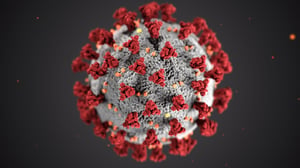
Your Employee Has Tested Positive for COVID-19….Now What?
Important Covid Resources:
- NHADA COVID Playbook
- Everything You Need to Know About Screening
- New Hampshire COVID-19 General Travel and Quarantine Guidance, & Employer Screening and Exclusion Criteria
- CDC Cleaning and Disinfection Tips
- Updates to Covid-19 Guidelines and FFCRA Benefits
I wish I could say this is not a question we are getting here at NHADA-WCT but not only are we getting it; we are getting it more frequently. The number of positive cases in New Hampshire are increasing. Experts warned of a “second wave” and of the complicating factor of the flu and further compounded by the cool weather moving folks inside.
PARTNER SPOTLIGHT
Dealer Management System, Computer Technology, Media/Advertising, Automotive Auction, F & I/Aftermarket Products, Automotive Technology Training & Compliance
 A NHADA Gold PARTNER
A NHADA Gold PARTNERComputer Technology, Automotive Shop Equipment, Environmental Services
 A NHADA Platinum PARTNER
A NHADA Platinum PARTNERF & I/Aftermarket Products, Automotive Technology Training & Compliance, Environmental Services
.png?width=150&name=corp_logo_horz_on_light_with_trademark_symbol_1200w%20(002).png) A NHADA Diamond PARTNER
A NHADA Diamond PARTNERF & I/Aftermarket Products, Financial Services, Automotive Technology Training & Compliance
 A NHADA Diamond PARTNER
A NHADA Diamond PARTNERWe have seen area businesses have to close temporarily due to staff having tested positive and the media is reporting more each day. Unfortunately, recommendations and guidelines are not mandatory. People are experiencing “COVID Fatigue” and are just tired of following the recommendations of the experts. This is a crucial time in the pandemic and we have to remain vigilant. We have heard of businesses doing a good job screening their employees and applaud those who are working hard to prevent the spread.
We are here for our members during this pandemic and are ready with the most up to date information from all available sources from the State of New Hampshire to the Centers for Disease Control. An amazing resource that should be printed and kept close by is the New Hampshire COVID-19 General Travel and Quarantine Guidance, & Employer Screening and Exclusion Criteria that was updated August 27, 2020. Per these guidelines you should be screening your employees everyday when they arrive at work before they are allowed to work. These guidelines are used as a reference for this article.
One of your employees informs you they have just tested positive for COVID-19; now what?
- If they have come to work to tell you they tested positive or find out while they are at work; they need to leave the work place immediately. People who have tested positive should have or will be contacted by the state for contact tracing. They should also be in contact with their primary care provider who will offer assistance for their care.
- Now the next question is are they symptomatic or asymptomatic?
- Symptomatic Persons who tested positive
- They must self isolate at home until the following symptom based criteria are met for discontinuation of isolation:
- At least 10 days have passed since symptoms first started, AND
- At least 24 hours have passed since last fever (off any fever-reducing medication), AND
- Symptoms have improved
- Asymptomatic Persons who tested positive
- They must self isolate at home for 14 days
- They must self isolate at home until the following symptom based criteria are met for discontinuation of isolation:
- Symptomatic Persons who tested positive
We now know how the person who tested positive is being handled; now what about everyone else at work?
- Non-Household Close Contact with someone who has been confirmed to have COVID-19 in the past 14 days
- If you have symptoms
- Isolate and get tested. If negative – self quarantine for 14 days from last exposure. If positive self isolate and follow previous guidelines
- If you are asymptomatic
- Self quarantine for 14 days from last day of exposure and get tested. If negative you are not exempt from the 14 day quarantine; it must be maintained. If positive self isolate and follow previous guidelines
- If you have symptoms
We now know how to handle the employees; what about the building?
- Your business needs to be cleaned even more thoroughly after learning an employee has tested positive for COVID-19. The CDC has outlined this process here.
- Most businesses will close or shut down for this cleaning and / or do this after hours; but it needs to be done for the safety of the employees and customers.
This can all be very confusing and interpretation is based on understanding. Some questions arise in regards to some of these frequently used terms:
What is close contact?
The definition of close contact changed as of last week per the CDC. It is now defined as anyone who has spent a total of 15 minutes over 24 hours and within 6 feet of an infected person will now be considered a close contact and therefore at risk for catching and spreading COVID-19
What is the difference between Isolation and Quarantine?
Isolation applies to people who are sick and quarantine applies to people who have been potentially exposed. They both mean to stay home and away from others, but the time required for each differs.
What is the difference between symptomatic and asymptomatic?
Symptomatic refers to having symptoms; so the person would have some or all of the symptoms commonly seen with COVID-19:
- Fever or feeling feverish
- Respiratory symptoms such as runny nose, nasal congestion, sore throat, cough, or shortness of breath
- General body symptoms such as muscle aches, chills and severe fatigue
- Gastrointestinal symptoms such as nausea, vomiting, or diarrhea
- Changes in a ones sense of taste or smell
COVID-19 continues to be a threat to us all; its hitting home now with cases on the rise and our members are experiencing employees who are testing positive. Everyone needs to interpret the guidelines and suggestions as more than a recommendation; they need to be taken seriously and adhered to. NHADA has prepared for you a COVID Playbook to help you follow these guidelines.
We wish everyone to be safe and well; but if an employee does test positive we can help you through this. Please reach out with any questions at 800-852-3372 or email Marta at msilakka@nhada.com. We have many resources to offer and if everyone works together, we can keep each other safe.


















.png?width=150&name=Ally_Final%20Logos%20and%20Pairings_11.14.2018-01%20(2).png)


-2.png?width=150&name=Wipfli%20Logo%20Blue%20RGB%20(1)-2.png)


.jpg?width=150&name=NHADA_Partner_FTR_Img_NHADA_Insurance%20(1).jpg)


.jpg?width=150&name=NHADA_Partner_FTR_Img_JMA(1).jpg)







